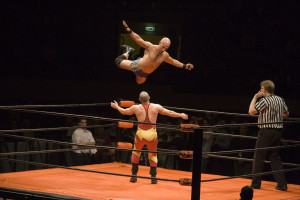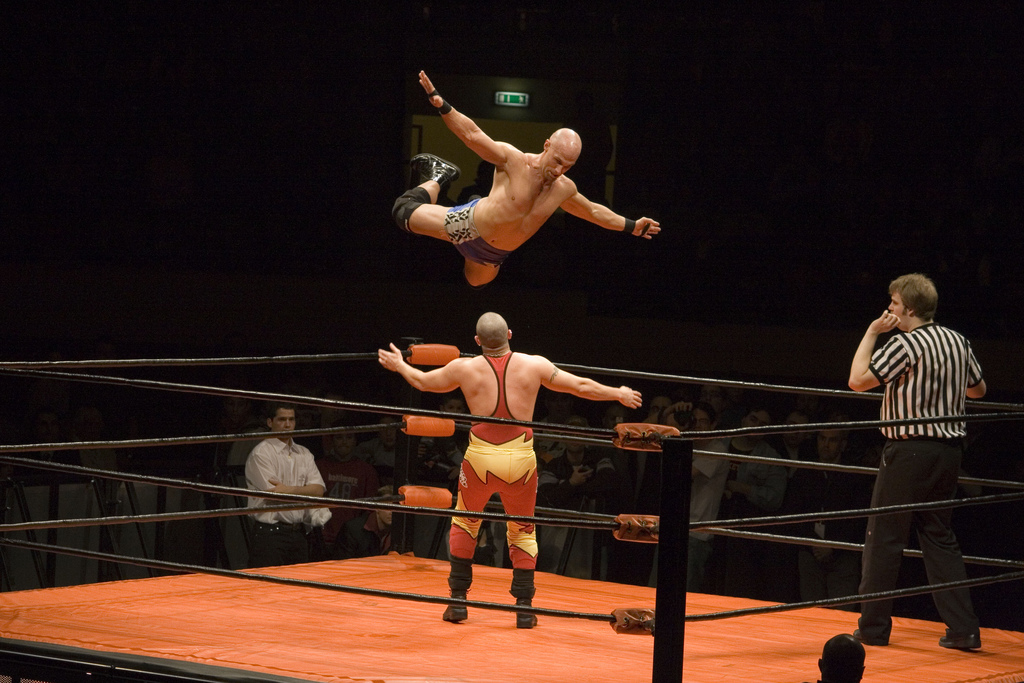The other day I wrote a post about the sounds you hear when you watch sports on television and which of them are real, which enhanced, and which fake. Then yesterday things got very real when I quit my job! Today we’ve got a story about (as Dave Chappele might say), when keeping it fake goes wrong. Everyone knows that professional wrestling is fake but not as many know that behind that veneer of unreality, it can be all too real for the wrestlers. Two recent pieces from Deadspin and Snap Judgement covered this quasi sport in interesting ways.

Deadspin republished an article from Jacobin, a magazine offering “socialist perspectives on politics, economics, and culture.” The article covers the history of labor relations in professional wrestling and is devoted to it’s thesis that “the billion dollar spectacle of pro wrestling relies entirely on the ruthless economic, mental, and physical exploitation of its performers.” Its tone is a little arch for my taste but it’s quite convincing. I was particularly interested to hear how pro wrestling’s leaders used the very fact that its competition isn’t real to their own advantage:
Another delicate maneuver: is a pro wrestling match a competition, or an exhibition? A seemingly minor distinction—but in the eighties, the money men of pro wrestling broke kayfabe, that code of silence safeguarding the industry’s competitive integrity, to all but bellow at state lawmakers that the matches were predetermined, that the whole show was “fake.”
Why? The benefits were compelling. If pro wrestling is just “entertainment,” there is no need for regulatory scrutiny. By pushing through deregulation, with the help of sleazy right-wing lawyers like Rick Santorum, the WWF wriggled out of paying taxes on their TV broadcasts and sloughed off any oversight by state athletic commissions. In New Jersey, for instance, following the state legislature’s 1989 deregulation of the industry, the state “would no longer license wrestlers, promoters, timekeepers and referees,” and wrestlers “would no longer be required to take physical examinations before an exhibition”—a fateful dereliction in a business rife with injury.
As the quote above hints at, professional wrestlers face terrible physical risks. Wrestling is “fake” in that the results of the matches are known by its participants but its physical toll is very real. The acrobatic violent simulations in the ring take close coordination and can easily go wrong. Beyond that, wrestlers take drugs. Lots and lots and lots of drugs. For all the talk of whether its worth trying to ban performance enhancing drugs in “real” sports, wrestling provides a clear example of what can happen if you allow anything. You can understand the dangers of wrestling through numbers — as this wrestlinginc.com article from 2011 shows, of the “of the 51 talents who appeared at the 1991 WWE pay-per-view WrestleMania VII, 14 have died prematurely.” It compares that to top level boxers, football players, and musicians from 1991 and there’s no contest whatsoever in how fatal the activities seem to be.
You can also understand the danger through personal stories like Kevin von Erich’s as brought to you by Snap Judgement. Von Erich was one of five wrestling brothers who followed their father into professional wrestling. It’s a great and horrible story made all the more poignant by von Erich’s gravely voice and his clear love for the profession that did him and his family so much harm. Listen to it here.

